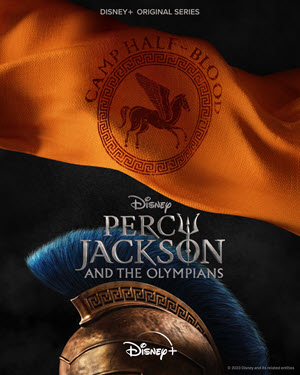Percy Jackson and the Olympians
 I’d enjoyed the one Rick Riordan book I have read (Magnus Chase and the Hammer of Thor, featuring a gender-fluid child of Loki), so when I saw a Percy Jackson series pop up on Disney+ I was interested. Then some of my Classicist friends started saying good things about it, so it moved up the watch list.
I’d enjoyed the one Rick Riordan book I have read (Magnus Chase and the Hammer of Thor, featuring a gender-fluid child of Loki), so when I saw a Percy Jackson series pop up on Disney+ I was interested. Then some of my Classicist friends started saying good things about it, so it moved up the watch list.
For those of you not familiar with Riordan’s work, he specialises in YA books about teenagers who are the children of various pagan gods. The Percy Jackson series was the first, and features Perseus Jackson, a son of (redacted, spoiler). The TV series, Percy Jackson and the Olympians, is based on the first Percy book, The Lightning Thief, in which our hero and his pals have to return a stolen thunderbolt to Zeus in order to avoid a war in Olympus.
Riordan’s success is doubtless a result of the readability of his books, and the likeability of his young protagonists. However, he is also well known for his commitment to diversity and inclusion. He was heavily involved in the production of the TV series, and I’m told that he used the opportunity to change a few things from the original book that, with hindsight and feedback from young readers, he wishes he’d done differently. The contrast between him and that other hugely successful writer of YA fantasy could not be more stark.
What Classicists love about Riordan, however, is that he has a solid understanding of his source material, and presents it in interesting ways. There are many different versions of the Greek myths, written at different times in Graeco-Roman history, by people with very different agendas. We tend to know the versions that Victorian-era Classicists thought we ought to know, and those tend to be heavy on the patriarchy and queer erasure.
The TV series uses a couple of stories which Riordan uses to get his viewers to question what they know of the myths. One is the legend of Medusa, and the other the relationship between Ares and Aphrodite. I suspect that he goes into both in much more detail in the book. The series also features Procrustes, who is little known and quite fun. I’m a little confused by the role of Echidna, but it would be a spoiler to explain why. Maybe I need to read the book.
The young actors who play Percy and his friends do an excellent job. I am also totally convinced that Hephaestus would build a mad theme park. Having Lin Manuel Miranda as Hermes seemed excellent casting, and the guy who plays Ares is apparently a former wrestler, which explains why he was so good at being thuggish. I was much less impressed with the casting of Zeus, Poseidon and Hades, though I did like the use of a Black actor for Zeus because it will trigger the broflakes. Olympian gods can, of course, appear in any form they choose.
Overall I’d recommend this series if you have an interest in Greek myth, and assuming that you are OK with stories about precocious kids. I’m certainly hoping there will be a second series.